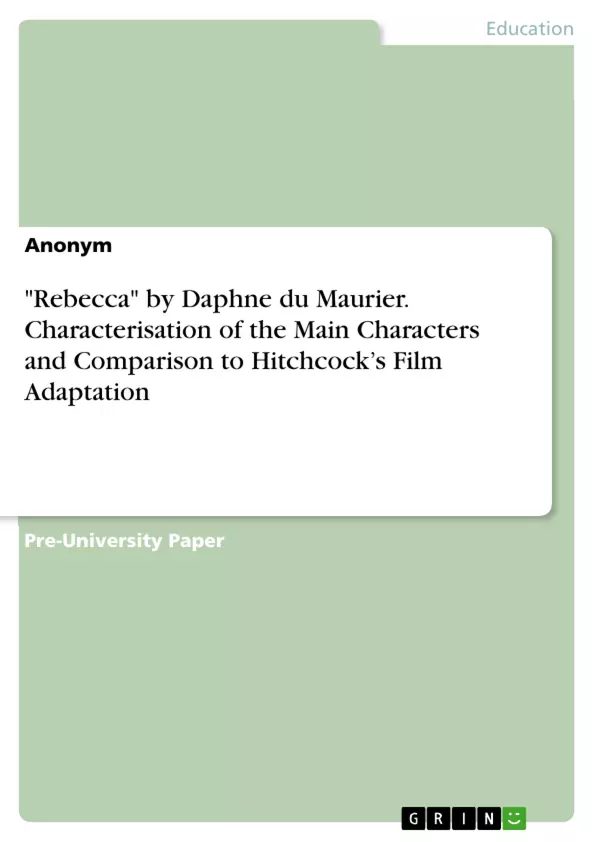In the following, the Gothic elements in "Rebecca" by Daphne du Maurier will be examined and the main characters will be analysed: every character in the novel represents a different type of social class of people with different habits and living standards. Therefore, I am going to interpret these types with their qualities and debilities and figure out the actuality in du Maurier’s characters. After that, my focus will be on the comparison between the novel Rebecca by Daphne du Maurier and the film adaptation of Alfred Hitchcock. In order to compare them, I will search for parallels or common features, and differences between the novel and the film.
Daphne du Maurier is widely known for her Gothic novels and short stories. Unaffected by the literary fashions of her days, she wrote simple narratives that appealed to the reader’s love of adventure, fantasy, sensuality and mystery. Her novel "Rebecca", published in 1938, was probably her most famous novel. It has never gone out of print and is one of the great international bestsellers. Du Maurier began writing it at a difficult point in her life: it was only a few years after the death of her adored father, she was pregnant with her second child and her husband, an officer in the Grenadier Guards, had been posted with his battalion. Her homesickness and her resignation about her wifely duties, together with a guilty sense of her own ineptness, were elements she included in her Gothic romance Rebecca. The novel’s iconic opening line was born out of du Maurier’s own preoccupation with Menabilly, a country house in Cornwall, which was later the inspiration for Manderley in Rebecca.
Table of Contents
- Introduction
- Plot Summary
- Rebecca as a Gothic Novel
- Characterisation of the Main Characters and Reference to Social Classes and the Political Subtext
- Comparison Between the Novel and the Film
- Common Features
- Differences
- Conclusion
Objectives and Key Themes
This seminar paper examines Daphne du Maurier's Gothic novel "Rebecca" and its film adaptation by Alfred Hitchcock. The primary objective is to analyze the characterization of the main characters within the novel and explore the social and political subtext embedded within. This analysis will be followed by a comparison of the novel and the film, highlighting both their similarities and differences. The paper aims to explore how both mediums portray the themes of love, obsession, identity, and the haunting presence of the past.
- Gothic elements in "Rebecca"
- Social class and character portrayal
- The psychological impact of the past
- Comparison of novel and film adaptation
- Themes of love, obsession, and identity
Chapter Summaries
The introduction provides a brief overview of Daphne du Maurier's life and work, emphasizing the significance of "Rebecca" as her most famous novel. It also introduces the focus of the paper, highlighting the analysis of the main characters, their social context, and the comparison between the novel and its film adaptation.
The "Plot Summary" chapter offers a concise overview of the main events of the story. It introduces the nameless narrator, her relationship with Maxim de Winter, and the enigmatic presence of Rebecca, Maxim's deceased first wife. The chapter highlights the importance of the setting, Manderley, and the influence of the past on the present.
The chapter "Rebecca as a Gothic Novel" delves into the genre and analyzes how "Rebecca" exhibits typical Gothic features. It discusses elements such as atmosphere of mystery and horror, hints of violence, and the supernatural, exploring their role in shaping the narrative.
The "Characterisation of the Main Characters" chapter examines the portrayal of the main characters, considering their social class, habits, and living standards. It explores how these characters represent different facets of society and how their interactions contribute to the overall themes of the novel.
Keywords
The key topics explored in this seminar paper include Daphne du Maurier, "Rebecca", Gothic novel, characterization, social classes, political subtext, film adaptation, Alfred Hitchcock, love, obsession, identity, and the haunting presence of the past.
- Arbeit zitieren
- Anonym (Autor:in), 2018, "Rebecca" by Daphne du Maurier. Characterisation of the Main Characters and Comparison to Hitchcock’s Film Adaptation, München, GRIN Verlag, https://www.hausarbeiten.de/document/983900


